实质性代表、妇女健康和制度类型
IF 3.4
1区 社会学
Q1 POLITICAL SCIENCE
引用次数: 0
摘要
大量文献调查了立法机构中女性人数的增加是否会转化为有利于社会中女性的政策。本研究建立在描述性和实质性表征理论的基础上。然而,这些理论可能无法很好地适用于专制环境,在这些环境中,我们看到近年来女性立法者的一些最大进步。这篇文章揭示了女性描述性代表、医疗保健支出和按政体类型划分的健康结果之间的联系。我们使用2000年至2018年169个国家的样本发现,在所有制度中,女性立法者的比例与医疗支出的增加有关。然而,在封闭的专制国家中,妇女的健康状况并没有随着妇女代表性的增加而改善。与此同时,民主政体和选举专制政体的结果是相似的,这表明,即使是通过半竞争性选举产生的有限的纵向问责制,也可能促进妇女的实质性代表。本文章由计算机程序翻译,如有差异,请以英文原文为准。
Substantive Representation, Women’s Health, and Regime Type
A large body of literature investigates whether increasing the number of women in legislative office translates into policies that benefit women in society. This research builds upon theories about descriptive and substantive representation. However, these theories may not travel well to authoritarian contexts, where we see some of the largest gains in women legislators in recent years. This article unpacks the link between women’s descriptive representation, healthcare spending, and health outcomes by regime type. Using a sample of 169 countries from 2000 to 2018, we find that the percentage of women legislators is associated with increased healthcare spending across all regimes. However, women’s health outcomes do not improve with women’s descriptive representation in closed autocracies. Meanwhile, the results for democracies and electoral autocracies are similar, suggesting that even limited vertical accountability through semi-competitive elections may facilitate substantive representation of women.
求助全文
通过发布文献求助,成功后即可免费获取论文全文。
去求助
来源期刊

Comparative Political Studies
POLITICAL SCIENCE-
CiteScore
8.40
自引率
4.00%
发文量
69
期刊介绍:
Comparative Political Studies is a journal of social and political science which publishes scholarly work on comparative politics at both the cross-national and intra-national levels. We are particularly interested in articles which have an innovative theoretical argument and are based on sound and original empirical research. We also encourage submissions about comparative methodology, particularly when methodological arguments are closely linked with substantive issues in the field.
 求助内容:
求助内容: 应助结果提醒方式:
应助结果提醒方式:


